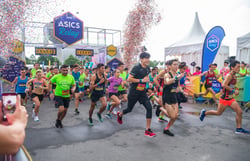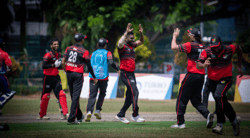
Sports is a glamorous industry, with top athletes like Cristiano Ronaldo, Kobe Bryant, Serena Williams and more often appearing in the public eye through their performances and promotional deals. Many young souls dream of emulating the success of their idols - just ask our very own Loh Kean Yew, who grew up watching Lin Dan and Lee Chong Wei exhibit their mastery of badminton.
Yet, being a sportsperson is not everyone’s cup of tea (and it is not for a lacking of trying). So what do you do if you love sports but don’t see a career as a professional athlete in your future? Fortunately, the sports industry isn’t just about life in the spotlight. The supporting cast that toils behind the scenes is just as, if not more important for bringing sports to the public.
In the first segment of this two-parter series, we explore the top performance-related careers one can pursue to incorporate his/her love for sports into day jobs as a non-athlete.
Coaches

Athletes need a coach who can effectively guide their technical, tactical, and physical development to help them improve at their sport. This is accomplished through analyzing their performances, instructing relevant skills and providing encouragement. The guidance may extend beyond the sporting stage if the athlete trusts the coach enough to confide in his/her struggles.
Exercise Physiologist

Exercise physiologists assess the athlete’s medical history to craft personalized fitness and exercise programs that improve recovery, flexibility, and performance. This is essential in helping with injury prevention or treating chronic issues.
Athletic Trainers

Athletic trainers work with athletes to treat and prevent common sports injuries. They are often the first medical professionals on the scene after an injury. Athletic trainers are critical in helping athletes train, perform, and recover from injury as safely and as effectively as possible. They also provide a vital communication link between the injured athlete, the physician, the coach, and sometimes the athlete's family to determine when it's right to return to practice and competition.
Physical Therapist

Physical therapists work with other medical professionals to develop treatment and rehabilitation plans for athletes who are recovering from injuries, illnesses, or suffering from chronic conditions.
Sport Psychologist

Sport Psychology plays a critical role in performance enhancement and in developing and maintaining athletes’ well-being within the competitive sports environment. Athletes are often under immense pressure, whether it be intrinsic, extrinsic, or environmental factors like the pandemic. Sport psychologists are therefore vital in helping these athletes self-regulate cognition, emotions, and behaviour, as well as optimize their performance on the big stage.
Sport Nutritionist

Without the proper fuel, an athlete's body cannot achieve peak performance. Sport nutritionists are introduced to help athletes plan their diets, ensuring that they are getting the proper nutrition during training, competition and recovery. Nutritional needs vary with each phase of training, and sport nutrition promotes healthy, responsible eating at all times.
In the second segment of this two-parter, we overview the careers that pertain to the sport industry as a whole. Stay tuned!
Related Articles
Related Topics
Recent Events & Programmes
Related Articles
Related Topics
Related Articles
View All
Related Topics
[BlogPost 164438712123 NSG 2024 Badminton: Senior Div Girls Quarter-Finals, BlogPost 164238055490 Evergreen Aleksandar Duric Still Making Headlines at 53, BlogPost 164170080646 NSG 2024 Rope Skipping: Junior Div Girls Freestyle Team Finals, BlogPost 162884973666 Move and Rest Better With Data From Your Own Body, BlogPost 163393049482 Life Comes Full Circle For Serangoon Garden Secondary School's Fahrish Khan, BlogPost 163258797651 Making Golf a Sport for All, BlogPost 162512222328 NSG 2024 Sepaktakraw: Senior Div Yuhua Primary School vs Qihua Primary School, BlogPost 162233592997 Gritty Lions Suffer Loss to China, BlogPost 162089384371 On Your Mark, Get Ready, Go Running, BlogPost 161670652697 Lions' Excellent Showing Against China, BlogPost 161435270031 Ogura Optimistic for Exciting Clash against China, BlogPost 161127614758 The Future of Basketball in Singapore: Why 3x3 is Here to Stay, BlogPost 161033673012 The Active Lifestyler's Guide to the New ActiveSG Delta Sport Centre, BlogPost 161128356680 Grand New Champions Crowned at WTT Singapore Smash 2024, BlogPost 160844835218 NSG 2024 Table Tennis: C Div Boys Pool Round, BlogPost 160210745115 NSG 2024 Basketball: Senior Div Girls Tampines Primary School vs Frontier Primary School, BlogPost 159881180544 Whirlwind Return to Women's Football, BlogPost 159633541417 Singapore Smash to Elevate a New Legacy, BlogPost 158983580420 NSG 2024 Rugby: B Div Damai Secondary School vs Peirce Secondary School, BlogPost 159003960202 SFA Fiesta: Kicking off 2024 to a Roaring Start, BlogPost 158830735126 NSG 2024 Football: B Div Girls Preliminary Round Meridian Secondary School VS Bowen Secondary School, BlogPost 158536989718 Team Nila Volunteers Recognized At Awards Ceremony, BlogPost 158270107806 NSG 2024 Hockey: B Div Boys Preliminary Round Raffles Institution VS St. Hilda Secondary School, BlogPost 157966862615 NSG 2024 Floorball: B Division Preliminary Rounds Kick Off!, BlogPost 157562433712 What Is Safe Sport?, BlogPost 157559446197 Sengkang Secondary: Cultivating Well-Rounded Footballers, BlogPost 157368261167 New National Training Centre for Cricket at West Coast Ground, BlogPost 155340164987 Active Ageing with Joey Bonifacio, BlogPost 155930815517 Inaugural Singapore Youth League kicks off from 24th February 2024, BlogPost 155340164727 Bukit Canberra : the Coolest Spot in the North, BlogPost 155368905255 How Padang Fandi Inspired Ayden to Chase his Dream, BlogPost 154755572826 Ageing Backwards with Elizabeth Cheang, BlogPost 154094657315 Running For Fitness, BlogPost 153318636178 Excitement Builds for FIBA 3x3 Asia Cup 2024, BlogPost 153198644247 World's Top Four Confirmed for 2024 HSBC Women's World Championship, BlogPost 149413941770 Cultivating Your Kids’ Interest in the Outdoors, BlogPost 149413941163 Making Sport More Appealing for Our Kids, BlogPost 149412549409 Solo Or Team Sport – Choosing the Best for Your Child, BlogPost 151197478798 Former Lions Stalwart Baihakki Khaizan Sheds Light on New Accreditation to Elevate Grassroots Football and Youth Development, BlogPost 80703591291 New Year, Fitter You! Here are the top 3 workouts for the New Year, BlogPost 81171151456 7 Reasons Why Sports are Great for Children’s Mental Health, BlogPost 80542065330 17 Best Yoga Classes & Studios in Singapore [+ Rating & Prices], BlogPost 149404351798 From Brush to Lens: A Student's Journey in the World of Art and Sports Photography, BlogPost 149402825063 The Benefits of Active Parenting, BlogPost 149397832009 Sweden Claim 9th Straight Gold at the Women's World Floorball Championship, BlogPost 149397831449 Lion City Sailors Win 2023 Singapore Cup, BlogPost 148511324266 Pitch Perfect with Jonathan Teo, BlogPost 148511724402 Seniors: Increase your flexibility bit by bit with these stretches, BlogPost 147866574167 A Valuable Experience In Spain for Singapore's National Development Centre U-14 Boys, BlogPost 146915317264 How one magical Kallang night changed the lives of Abirami and Daania forever]







.jpg?width=162&height=60&name=2XURUN2024%20-%20KV%20(1920%20x%20700px).jpg)


